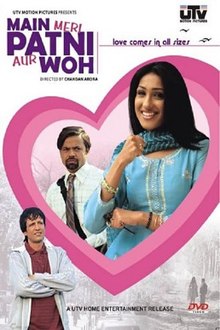|
Main, Meri Patni Aur Woh
Main, Meri Patni Aur Woh (English: Me, My Wife and Him)[a] is a 2005 Indian romantic comedy film, directed by Chandan Arora, starring Rajpal Yadav, Rituparna Sengupta and Kay Kay Menon as the leading actors. The film was released on 7 October 2005. It is inspired from Malayalam film Vadakkunokkiyantram. PlotThe film is about a qualified but short, 34-year-old man named Mithilesh and his insecurities about his height and personality when he marries Veena. He had never imagined such a pretty and well-grounded woman would marry a commoner. As his married life progresses with his devoted wife, his insecurities continue to grow. He becomes jealous of his friend Saleem, Veena's childhood friend Akash, and others who he claims are infatuated. Slowly, he suspects a change in Veena's behavior and starts believing she wants a divorce. Being a loving husband, he confesses his fear to Veena. But the hidden truth, disclosed at the very end, ultimately brings the couple closer. Cast
ProductionThe film was shot in Lucknow.[2] Soundtrack
Critical receptionIndrani Roy Mitra of Rediff.com wrote "A taut, yet down-to-earth, script keeps the film's interest alive till the last minute. Like Madhuri Dixit, here, too, Chandan's deft use of popular Hindi film songs to accentuate the mood of certain sequences deserves special mention."[3] Conversely Kaveree Bamzai of India Today called the script "stodgy" and criticised the casting of Yadav by writing, "Rajpal Yadav is a fine comic but it doesn't necessarily make him a versatile actor. So instead of the usual gags, the ones which have audiences in splits, he tries to do a Dilip Kumar. Which means he says his lines extremely slowly as if he is addressing a confederacy of dunces, and tortures himself-and the audience-with all manner of imaginary woes."[4] Taran Adarsh of IndiaFM gave the film 1 out of 5, writing, "On the whole, MAIN MERI PATNI AUR WOH is a decent entertainer that could've been an engaging fare had it not been for a mediocre second half. It might appeal to a handful of critics [in awe of such cinema], but definitely not the common man who decides the fate of a film."[5] Footnotes
References
External links
|
||||||||||||||||||||||||||||||||||||||||||||||||||||||||||||||||||||||||||||||||||||||||
Portal di Ensiklopedia Dunia
